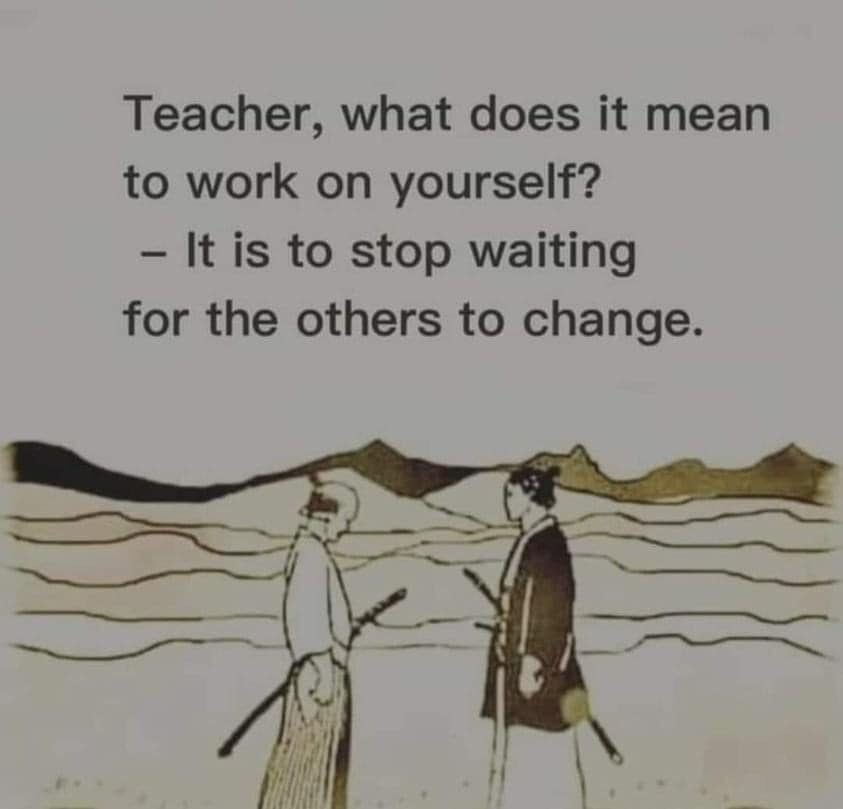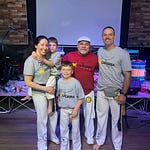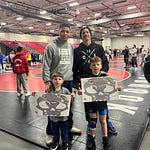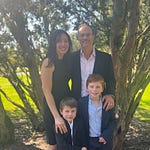🔥Welcome to Volume #00093!🔥
I’m Christian Champ. This is ☯️The Middle Way Newsletter ☯️. It is a place where I write, explore, share, and invite you along for the journey.
If you enjoy the newsletter, please share it with your friends.
🥋Why We Want to Step into the Fire to Test Ourselves and Grow 🥋
“You got this!”
“No mistakes now.”
Those thoughts floated past me as I toyed with the fire.
I had my opponent in my guard (my legs wrapped around his waist), finding myself in a dominant position.
I saw the clock in front of me, watching it tick down.
The nerves I felt waiting to enter the mat dissipated, replaced by the energy of competition. The power of someone trying to submit and smash you supersedes worrying about your performance.
Up 9-0, all I needed to do was hold on for two minutes and twenty seconds, making sure not to get submitted.
The Fire
The best part of trials by fire is the heat. It pushes us up a level and magnifies the event and outcomes.
We can feel it burning our feet, but we must keep moving to avoid getting hurt. We can feel the fire giving us energy as long as we respect its power.
I found myself in the thick of the fire at The Chicago Open, a Brazilian JiuJitsu Tournament at Chicago State University. This was my first-ever tournament. Luckily watching my six-year-old son compete helped me get mentally prepared.
Laying in the middle of mat 1, controlling my opponent, I heard my coach screaming instructions. I heard my son shout words of encouragement. I listened to my teammates, offering words of encouragement and instructions of their own.
Each match felt like five minutes of being at the center of the universe while fighting for my life.
I showed up to do my best. I showed up to exemplify for my son how people like us compete. I showed up to represent my academy and my training partners.
When there is fire, people like us do our best and leave it all on the mat. Everything matters, and at the same time, nothing matters.
I didn’t care as much about winning as showing up. Like all great journeys in life, it is ultimately about stepping into the fire and doing the thing.
Hour after hour on the mat preparing with classes, private sessions, and all the extra reps the past couple of months culminated in The Chicago Open. Four days a week, I went to Double Five Chicago to train and fight with guys and girls pushing and challenging me.
All that training got expressed in a couple of five-minute matches. Hours to prepare for the fire, to adjust to the discomfort, to improve my game and get better.
The goal is always 1% better.
If we’ve prepared, the challenge goes by in a flash. The outcome is a nice side note to the central theme of doing the thing after we put in the work preparing.
Winning is great, but competing is the thing. No matter the outcome, we learn something about ourselves. We learn about ourselves, our training, and our preparation.
It’s about walking into the fire and walking out appreciating the lessons it teaches us. We grow when we walk into the fire. The joke is the fire doesn’t matter. It is there to test and train us, but it mainly makes us care.
When the buzzer sounded, I felt that joy of victory, but the absolute pleasure comes from the journey.
On To the Next One
The fire went out, and then we search for the subsequent fires. We assemble our squad, coaches, and teachers and prepare for the next one.
It’s been a year of stepping into new fires for me and standing in the ready position for the next one.
What fire are you dancing with?
What skills are you trying to acquire or develop? What process do you have in place to achieve the objective?
How do you make the outcome a side note and the process of getting there the actual concert?
Marc trained with me at the academy, and we stood on the podium together as we represented with gold and brozen. When we aren’t training or competing, we help coach our sons and watch their tournaments.
📓Things to Think About📓
Seth Godin on the downside of synchronization
We want to take a long view of our actions and our efforts. We change things slowly for that lasting change.
The Grateful Dead were the #1 live touring band more years than any other… and yet they only had one top 40 hit. Connection was worth more than wide and shallow sync.
Drip by drip makes the wave
Pretty Safe Lies by Bryan Caplan
Bryan writes about our obsession with asking is it safe. This fails to acknowledge that nothing is perfectly safe, and everything exists on a risk spectrum.
COVID showed and continues to show how poorly this concept is understood.
How are we supposed to cope in this desert of Social Desirability Bias? Do a little math. Compare unfamiliar risks to familiar risks. Start with: How does this risk compare to the risk of driving? Nor should you crunch the numbers in isolation. Do it with your family, especially your kids. If you don’t lead your family with good math, demagogues will lead it with bad poetry.
A VR technology helping with transcendence by Hana Kiros
Holotropic breathwork in the right environment creates this for me. Fun stuff to watch closely and potentially incorporate into our future ecology of practices.
Glowacki didn’t design Isness-D with the goal of replicating a psychedelic trip. But he was interested in using VR to produce something psychedelics reliably elicit—what’s known as a “self-transcendent experience.”
Self-transcendent experiences exist on a spectrum. Getting lost in a great book could be considered a weak one; the ego death that high doses of psychedelics can induce is on the opposite end. In psychedelic clinical trials, people who report more intense feelings of self-transcendence typically also see the most significant symptom improvements.
What marks a self-transcendent experience is the dissolution of our typical self-definition as a discrete individual, separate from other people and the environment. During such an experience, a deep feeling of unity with other people or your surroundings allows you to expand your self-concept to include them.
🎧Things to Listen, See, and Watch 🎧
The Comfort Crisis by Michael Easter is a recommended read.
This book resonated with my recent piece on discomfort.
The main theme is that life has gotten too easy, making us exacerbate any stressors that show up. We are unlearning how to live with nature and stress because of the manufactured air keeping us at 72 degrees no matter the season and our phones being able to constantly entertain us.
My impactful takeaways from the book:
We need big uncomfortable challenges to create good stress and meaning
“But a radical new body of evidence shows that people are at their best—physically harder, mentally tougher, and spiritually sounder—after experiencing the same discomforts our early ancestors were exposed to every day. Scientists are finding that certain discomforts protect us from physical and psychological problems like obesity, heart disease, cancers, diabetes, depression, and anxiety, and even more fundamental issues like feeling a lack of meaning and purpose.”
We need focused time and unfocused time when we do nothing. No stimulation, no entertainment, just being in the world
"The paradox is that these mechanisms that helped keep us alive are now hurting our health," he explained. "We have less tolerance for distress. If we feel something unpleasant, like boredom, typically we would have to just be with that unpleasantness, and then we'd find a productive outlet. But we don't have to do that anymore. We can use our phone to distract ourselves." Or, as Danckert put it, we simply consume more "junk food for the mind.
We need to do hard things and face real stressors
It passed over my sweat-soaked T-shirt as Elliott continued. "I believe people have innate evolutionary machinery that gets triggered when they go out and do fucking hard things. When they explore those edges of their comfort zone.”
They'd fast and drink little water, expose themselves to the elements, and go without shelter or fire. Yellow Wolf, a Nez Perce warrior who fought in the Nez Perce War of 1877, explained that the process developed "strength to help you in dangers, in battle." These types of mind-body-and-spirit-strengthening vision quests were common among many indigenous American tribes
We need nature
Famed biologist E. O. Wilson developed a theory, called the biophilia hypothesis, which says we have an ingrained call to be in nature that's in competition with our evolutionary desire to control our environment. The thinking goes like this: We evolved in nature, and therefore have programmed within our genes a need to be in and connect with nature and living things. If we don't, we go a little haywire, as if we're missing a necessary nutrient for our body, mind, and sense of self.
We need to manage our stressors by doing positive things, not eating or drinking
"People who are at a consistently healthy weight don't have better genetics or a higher metabolism, and they don't magically burn more calories," he said. "They're just more likely to deal with stress by, like, going for a walk instead of eating. That's really the difference." More research has backed up this claim, finding that uncontrollable factors like metabolic dysfunction are exceedingly rare. The science suggests that genes may play a role in obesity. But these genes seem to move the dial only when they meet our new laziness-inducing, foodfilled environment. We didn't used to get fat, and our genes haven't changed.
"Is it perhaps harder for some people to lose weight than others? Maybe. Will those people have to work harder? Maybe. But life isn't fair, and by harping on genes, people just give themselves an excuse to fail."
We need to have a death practice
Ignoring death wasn't always the American way, said Gary Laderman, PhD, a death historian at Emory University. "In the nineteenth century and before, Americans were much more intimate with death and it was much more a part of everyday life-death was family and community based. It was homespun and homegrown. When someone died the corpse was right there.
“The key turning point is Abraham Lincoln's death and funeral. Lincoln becomes the most public figure ever to be embalmed, and the process is described in newspapers," Laderman told me. "Embalming then becomes mainstream and the funeral industry grows and expands. For some it’s the way to keep death distant, a way to not see death or face it."
Jason Silva at the Burn
In honor of Burning Man (taking place this week at Black Rock City. Below is a video from Jason Silva that he filmed at the Burn.
“We are gods and we are worms”





💣Words of Wisdom💣
The taming of the mind, the dissolution of the ego and the letting go of all fears can only evolve through patient practice. There is nothing worth attaining on this or any other planet that doesn't take practice. As you do this, you become aware of another ‘space’. - (Kenny Werner)
It will seem difficult at first, but everything is difficult at first. (Miyamoto Musashi, The Book of Five Rings)
That's one thing about being creative. Don't be too set in your own ways. Be suggestible from time to time. (Questlove, Creative Quest)
In life design, we reframe a lot. The biggest reframe is that your life can't be perfectly planned, that there isn't just one solution to your life, and that that's a good thing. (Bill Burnett and Dave Evans, Designing Your Life)
Slay that dragon once, and he will never have power over you again." (Steven Pressfield, Do the Work)
The simplest, and perhaps most powerful, way to be intentional is to ask yourself one golden question. This can greatly increase your authentic gravitas: How do I want them (the people I encounter) to think, feel, and act as a result of this encounter with me? -(Dr Rebecca Newton, Authentic Gravitas)
Life is that which is discontent, which struggles and seeks, which suffers and creates.(Will Durant, Fallen Leaves)
I was grieving. People grieve lost loved ones every day. I realized that I wasn’t being denied something, I was being given something no one gets to avoid. There wasn’t a way back from, or around, the pain of losing my mother. The way out was through it. (Jeff Tweedy, Let's Go)
🙏Thanks for Reading🙏
What fires do you need to touch and dance around? What preparation do you need to undertake for your journey?
Any thoughts or comments, please share!
Namaste,
Christian
Nothing better than standing on the podium with your training partner. Hopefully, we do it again in the future.


















